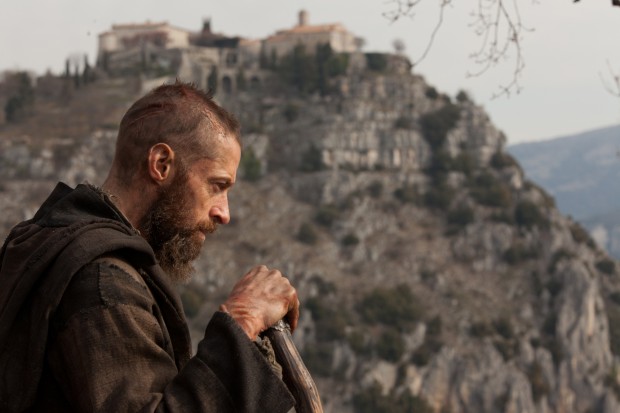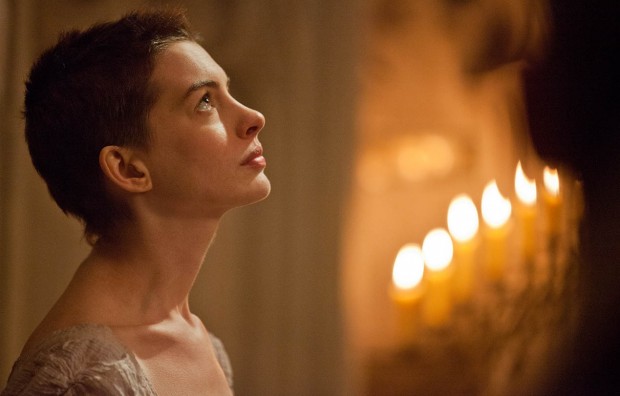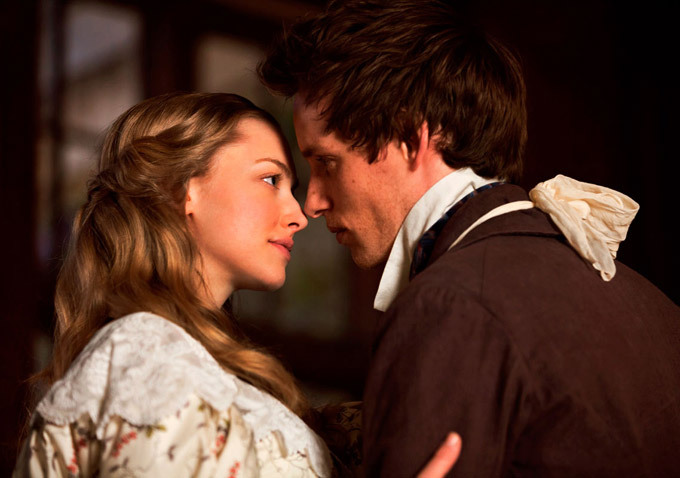Since its Broadway premiere 25 years ago, Hollywood has been trying to figure out how to monetize the hit musical Les Miserables, based on Victor Hugo‘s novel, on the silver screen. The floppy 1998 non-musical Liam Neeson version notwithstanding, Tom Hooper‘s much-talked about adaptation is the first real attempt at the epic tale with all of the set pieces and musical numbers to boot.
Starring the incomparable Hugh Jackman as Jean Valjean, the thief-turned-prisoner-turned-saintly businessman, Russell Crowe as Javert, the justice-obsessed cop after Valjean, and Anne Hathaway as Fantine, the factory worker-turned-prostitute, Hooper constructs his own world out of the one already built for him. The results are astonishing.

With an opening that proudly announces its over-the-top, epic scope, Valjean is introduced bald and rail-thin, one of many imprisoned slaves pulling an enormous ship into port with rope while Javert watches over them high above. Not unlike the musical — or the novel for that matter — the film paints in large strokes, wearing every theme and emotion on its sleeve.
This is the kind of cinema, bombastic and overblown, that will turn away its fair share of viewers. And the new style of recording all musical numbers live on set – as opposed to recording them in a sound studio before the cameras ever start rolling then lip-syncing to the music later – is a bit jarring at first. Luckily, all the performers are more than up to the task, including Mr. Crowe, who is mightily impressive playing a rock-opera-y version of the determined lawman. Hathaway, as expected (given the timelessness of her tragic heroine), shines in her moments on screen, providing one of the more frail and desperate incarnations of the character we have ever seen. Hooper, aware of the power of his actress both vocally and emotionally, strips away all other music and sound for Fantine’s largest number, “I Dreamed A Dream,” allowing her voice to swallow the entire theater.
It’s clear the core creative inspiration comes from the musical rather than the novel, as Hooper does not let any of the show’s now-iconic show-stoppers slip by. And while this kind of high fidelity to its source material results in the film’s 2-and-a-half hour run time, the pace rarely slips. Traversing over two decades and all over France during the advent of revolution, the camera literally surges up, up and away once one act concludes, then dives back down into to the next.

Following Fantine’s death, the film, like the musical, struggles with its initial relevance in the tale being told, but is saved thanks, in large part, to Eddie Redmayne‘s turn as Marius, one of the leaders of revolting students building a barricade to fight off the French military. Redmayne injects the film with the charm and romance we can usually rely on Jackman for. But given the staunch, fatherly goodness that Valjean must take on in the latter part of this film, Redmayne’s sexy young lover is the one who keeps things exciting. His counterpoint, young Amanda Seyfried playing an older Cosette, does not fare as well. It is a role that has never held much weight, and it remains so here. No longer young and poor, Cosette serves as a near-angelic presence with few feelings that seem to be her own. We care more about Valjean seeing Marius as a son then we do seeing Cosette’s wide eyes fall in love. There is also Sacha Baron Cohen and Helena Bonham Carter who lighten things up as the Thénardiers, innkeepers who entertain mightily in a particularly-inspired rendition of “Master of the House.”
All themes, political and religious, are very prevalent here and never shied away from. Hooper, who foolishly attempted to give his standard underdog tale The King’s Speech a classical bent with his exuberant visual style, succeeds here in offering set pieces that are as grand as the lyrics and subjects being sung about. Whereas Jackman feels, in many ways, like the thespian we were waiting to bring the dynamic character Jean Valjean to life and to Hollywood, Hooper has emerged as the ideal filmmaker.
These poor, wretched ones are caked in dirt and tears, surrounded by rotting food and corpses. And yet, the sin-filled street Fantine finds herself selling her body out of is one of the most fantastical nightmarish cinematic creations in some time. Everything is hyper-real to the point of fantasy, this type of France representing a kind of Hell that’s aware of the Heaven right on the fringes. If Hollywood still means to revive the musical genre, this may be the alchemy to do so.
Les Miserables opens on December 25th.

